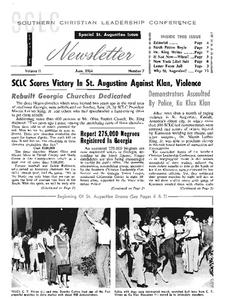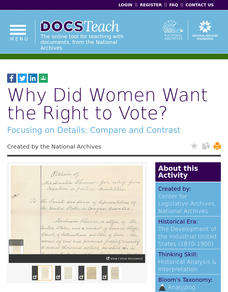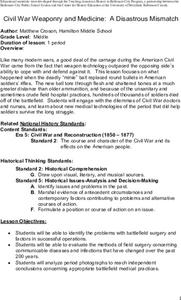K20 LEARN
Give Me Liberty or Give Me Death: The Journey to Revolution
The words of "Common Sense" and Patrick Henry's "Give me liberty or give me death!" speech ring throughout history. Scholars explore the nuances of each patriot's argument using excerpts from the famous pamphlet and speech and a recorded...
K12 Reader
Two Viewpoints of the Same Event: Lee Surrenders to Grant, 1865
How did Union General Ulysses S. Grant view the surrender of Confederate General Robert E. Lee in 1865, which effectively ended the United States Civil War? After reading an excerpt from Grant's autobiography, your young historians will...
Freedom Archives
Special St. Augustine Issue
The articles and images in the June 1964 edition of the Southern Christian Leadership Conference Newsletter detail the events in St. Augustine that were instrumental in the passing of the Civil Rights Act of 1964. The stirring...
American Battlefield Trust
1861: The Country Goes to War
What was it like to know the Civil War was coming? Using a graphic timeline activity and excerpts of speeches from Abraham Lincoln and Jefferson Davis, learners consider the early days of the conflict. The resource includes prompts for...
American Battlefield Trust
1862: Antietam and Emancipation
Was the Emancipation Proclamation a revolutionary document or just a military strategy? It proclaimed that all those enslaved in Confederate states would be "forever free." Logistically, though, it did little. The order, however,...
DocsTeach
Why Did Women Want the Right to Vote?
No taxation without representation may have been the battle cry of the American Revolution, but women used the same argument when demanding their right to vote in the late 1800 and early 1900s. Young historians examine petitions from...
Center for History Education
Civil War Weaponry and Medicine: A Disastrous Mismatch
Ironically, science was the reason why the Civil War was so deadly. Despite the use of medical practices now considered barbaric—such as conducting surgery with bare, dirty hands—developments in weaponry meant that more men died on and...
Center for History Education
Women's Rights in the American Century
Today, many young people find it hard to understand why it took over 150 years for women in the United States to get the right to vote—why there was even a need for the suffrage movement. As they read a series of primary source...
The Alamo
A Lesson in Citizenship
What does it mean to be an American citizen? Lieutenant Colonel Commander William Barret Travis believed that it meant honor to country first—even above one's own life. Middle and high schoolers read his final letters from the Alamo that...
Daughters of the American Revolution
Lesson 1: How Do Society’s Expectations Influence Education?
The history of women's education can be traced back to the delicate stitching of student samplers from the 19th century. Modern-day pupils examine and analyze four primary sources, three of which are images of embroidered samplers, which...
National Endowment for the Humanities
How "Grand" and "Allied" Was the Grand Alliance?
Learn more about the Grand Alliance with a scaffolded lesson plan that includes four activities. Class members use primary sources to complete a map exercise, understand the goals and objectives of each individual nation, and participate...
US National Archives
WWII: Western Europe 1939-45 – Occupation
Warsaw, Poland, suffered much of the blunt of World War II—but according to Polish letters from the early days of Nazi occupation, other parts of the country were much worse off. High schoolers use the letters and contemporaneous...
New York State Education Department
Global History and Geography Examination: August 2016
Challenge class members with an architectural resource that asks them to use a variety of skills to answer multiple choice questions as well as several essay prompts about the streets and house fronts of ancient Athens. One question asks...
Curated OER
Written Document Analysis
For this primary source analysis worksheet, learners examine types of written documents and respond to 6 analysis questions about them.
Library of Congress
Women's Suffrage Movement Across America
An engaging resource provides many primary source materials to inform a study of the Women's Suffrage Movement. Suggestions include building a timeline of the fight, using the documents as the basis of a DBQ, and/or using a Venn...
Curated OER
Man's Best Friend:The Old Drum Story
Young scholars explore the Missouri courts. For this primary sources lesson, students examine the Missouri court case Burden v. Hornsby as well as other primary documents and narratives relating to the case. Young scholars analyze the...
Curated OER
Lines From Behind the Lines
Fifth graders create a timeline of events in a soldiers life. In this World War I lesson, 5th graders learn about the Great Depression and World War I. Students watch video segments about World War I and examine primary...
Curated OER
Can You Hear Me Now?
Students explore the industry involving communication and put communication devices into activities. In this communication lesson plan, students put items into chronological order, review primary sources, compare and contrast items, and...
Curated OER
Causes of the American Revolution: the Stamp Act Crisis
Fifth graders view primary documents to become familiar with the causes of the American Revolutionary War. In this Causes of the American Revolution lesson, 5th graders answer questions based on the documents. Students complete a...
Curated OER
Worksheet for Analysis of a Photograph
In this primary source analysis worksheet, learners respond to 25 short answer questions that require them to analyze a photograph from the Tennessee State Archives.
Curated OER
A New York Rioter Explains His Opposition to the Draft
In this primary source analysis worksheet, learners analyze a letter from a New York rioter over the Conscription Act. Students respond to 3 short answer questions about the letter to the editor of the New York Times.
Curated OER
Corrido of the Uprooted Ones
In this primary source analysis worksheet, students analyze the song "Corrido of the Uprooted Ones." Students respond to 3 short answer questions about the lyrics of the song.
Curated OER
President Roosevelt Seeks Feedback on New Deal Programs
For this primary source analysis worksheet, high schoolers analyze a letter from President Roosevelt to clergymen regarding New Deal programs. Students respond to 1 short answer question about the letter.
Curated OER
Slave Laws in British Colonial New York, 1664—1722
In this primary source analysis worksheet, students analyze colonial New York slave laws. Students respond to 4 short answer questions about the laws.























